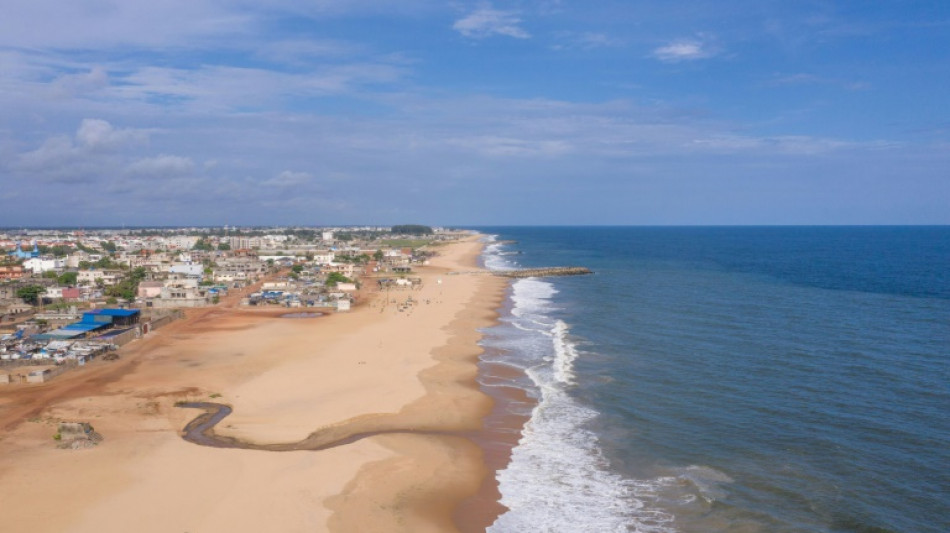
-
 USA Olympic squad of NHL stars heavy on Four Nations talent
USA Olympic squad of NHL stars heavy on Four Nations talent
-
Milei eases tax evasion rules to draw out 'mattress dollars'

-
 France hooker Mauvaka returns after eight-month layoff
France hooker Mauvaka returns after eight-month layoff
-
Nigeria police charge fatal Joshua crash driver with dangerous driving

-
 Russia scores highest Ukraine gains since first year of war
Russia scores highest Ukraine gains since first year of war
-
Guardiola reaffirms City contract as Maresca speculation builds

-
 Iran's protests: What we know
Iran's protests: What we know
-
2025 was UK's hottest and sunniest year on record

-
 Strasbourg's Rosenior coy on Chelsea speculation
Strasbourg's Rosenior coy on Chelsea speculation
-
Swiss bar blaze suspicions fall on sparklers waved by staff

-
 US woman killed in rare suspected mountain lion attack
US woman killed in rare suspected mountain lion attack
-
Slot admits Liverpool's season has been 'constant battle'

-
 Spurs forward Johnson completes Palace switch
Spurs forward Johnson completes Palace switch
-
Endrick absent from Lyon year opener but 'adapting well': coach

-
 Ukraine says 19 wounded in Russian strike on Kharkiv housing area
Ukraine says 19 wounded in Russian strike on Kharkiv housing area
-
6.5-magnitude quake shakes Mexico City

-
 Tesla sales slip as it loses EV crown to China's BYD in 2025
Tesla sales slip as it loses EV crown to China's BYD in 2025
-
UK sees record-high electricity from renewables in 2025: study

-
 Budanov: Enigmatic spy chief set to become Zelensky's top aide
Budanov: Enigmatic spy chief set to become Zelensky's top aide
-
Greece and Argentina make winning starts at United Cup

-
 Nortje gets nod for South Africa's T20 World Cup campaign
Nortje gets nod for South Africa's T20 World Cup campaign
-
Arteta urges Arsenal to break New Year Premier League curse

-
 Norway closes in on objective of 100% electric car sales
Norway closes in on objective of 100% electric car sales
-
Dani Alves invests in Portuguese third division club

-
 Trump says US will 'come to their rescue' if Iran kills protesters
Trump says US will 'come to their rescue' if Iran kills protesters
-
Orsted files lawsuit against US suspension of wind turbine leases

-
 South Koreans now free to read North's newspaper, once banned as seditious
South Koreans now free to read North's newspaper, once banned as seditious
-
Stocks make bright start to 2026

-
 Bashir, Potts in England squad for final Ashes Test
Bashir, Potts in England squad for final Ashes Test
-
Argentina topple Spain for winning United Cup start

-
 Champions Narvaez and Ruegg to defend Tour Down Under titles
Champions Narvaez and Ruegg to defend Tour Down Under titles
-
'Are they OK?': desperate search for the missing after Swiss fire

-
 'Are they OK?': desparate search for the missing after Swiss fire
'Are they OK?': desparate search for the missing after Swiss fire
-
Asia stocks make bright start to 2026

-
 Miami and Houston stretch NBA win streaks to four games
Miami and Houston stretch NBA win streaks to four games
-
Swiss investigators rush to identify victims of New Year's fire

-
 Bicycle kick king El Kaabi is new AFCON hero for hosts Morocco
Bicycle kick king El Kaabi is new AFCON hero for hosts Morocco
-
What to look out for in the Premier League transfer window

-
 Maduro elusive on US attack, open to dialogue
Maduro elusive on US attack, open to dialogue
-
Venus Williams gets Australian Open wildcard aged 45

-
 Trump blames bruised hand on aspirin, denies falling asleep
Trump blames bruised hand on aspirin, denies falling asleep
-
Dress for success: Mexican president's ideological attire

-
 Best of frenemies: Saudi, UAE rivalry bursts into view
Best of frenemies: Saudi, UAE rivalry bursts into view
-
'Positive signs' on hospitalised Australian cricket great Martyn

-
 North Korean leader's daughter in first visit to symbolic mausoleum
North Korean leader's daughter in first visit to symbolic mausoleum
-
The Crans-Montana fire: a Swiss tragedy that raises questions

-
 Around 40 killed as fire ravages Swiss ski resort New Year party
Around 40 killed as fire ravages Swiss ski resort New Year party
-
Australia's Khawaja to retire after Ashes finale, slams 'racial stereotyping'

-
 BCII Enterprises Coupon Token: Next-Generation Shareholder Engagement Model
BCII Enterprises Coupon Token: Next-Generation Shareholder Engagement Model
-
EB5 United Surpasses 700+ I-526E Approvals, Reinforcing Leadership in Rural EB-5 post-RIA


Benin struggles in battle to halt coastal erosion
Along its Atlantic coast, Benin's government has spent millions of dollars to protect coastal communities from sea erosion. But Doris Alapini can only watch as waves tirelessly eat away at her land and the large seaside restaurant she built.
The ocean is slowly winning the battle.
"The sea is advancing a lot. We have to do dredging or else block it, otherwise it will keep advancing," Alapini said as she walked along Cotonou's long sandy beach.
"I have seen how many times it has destroyed and invaded the neighbourhood."
She has lived for 27 years in the Jak district, one of the oldest and most chic in the economic capital of Benin. Every year, sea waters overflow into her area.
"The neighbourhood is under threat every day," she said.
"No one here has any guarantees. If there is a big wave, it will demolish the entire neighbourhood."
Not all coastal erosion is linked to climate change. But since 2002, Benin has lost kilometres (miles) of coastline, said Esquill Outiclissou, executive of the government's general directorate of environment and climate.
"The state has not remained idle," he said, pointing to protective structures, stone groynes and other installations, particularly to the east of Cotonou.
According to Outiclissou, nearly 100 billion CFA francs ($160 million) have been injected into the protection of Beninese coasts in recent years and the investment helped slow down the ocean's advance.
Africa often finds itself on the front line of climate change impact despite the continent contributing the least to greenhouse gas emissions globally.
Still, Benin and its littoral West African neighbours Togo and Ghana are, just like Pacific islands and coastal South Asian cities, at risk of shore erosion's impact on communities.
With global warming affecting sea levels, coastal erosion will be one of the subjects leaders will address when they meet for COP28 in Dubai in December.
- Race against time -
Raymond Mekpe, a 40-year-old fisherman, cannot believe the erosion losses.
Born in Cotonou, Mekpe might not be a climate expert but has his own indicators to illustrate the sea's unbridled advance.
"The homes of my grandparents and my parents were there," he said, pointing out to sea.
"We played somewhere there in our childhood," he added, gesturing towards another area where big waves crash.
Benin loses approximately 30 metres (yards) of its coastline every year, according to oceanographer Cossi Georges Degbe.
"It's really serious. And if nothing is done, within a few years we will lose the Cotonou Porto-Novo interstate road," the 51-year-old warned, referring to the main coastal route to the capital city.
"When we put protective structures in a given place, we are just moving the phenomenon along," he said.
For Outiclissou, the government must respond segment by segment, but "the segments that are still vulnerable are under study and will be dealt with in due course".
Thirteen structures have been built east of Cotonou starting from the coastal lagoon, he said.
Since then, the waves of erosion have become noticeably weaker, he added.
As well as rising water levels, due to climate change, extreme weather phenomena are increasing, "with very high waves washing over our coasts", explained oceanographer Degbe.
Alain Tossounon, president of a network of media focusing on water, the climate and environment, agrees more needs to be done.
"Efforts have not been sufficient and populations have not yet become aware of the importance of this phenomenon in the years to come," he said.
- 'Sea advances, destroys' -
With Benin not the only country concerned, joining forces with neighbours could bring more results.
"We must consider a regional approach to slow down the advance of the waves," Tossounon said.
Benin and Togo have already started working together -- a protective groyne of 18 kilometres (11 miles) in Togo and 24 kilometres in Benin made it possible to slow the waves in the fishing villages of Hillacondji and Aneho.
But despite these actions, seaside restaurant owner Alapini cannot help but feel angry.
"When we have populations who live by the sea, we have to have forecasts for them, a line in the state budget," she said.
"I'm shocked. By the time it takes to get funding, the sea is moving forward and destroying things."
O.Johnson--AMWN

